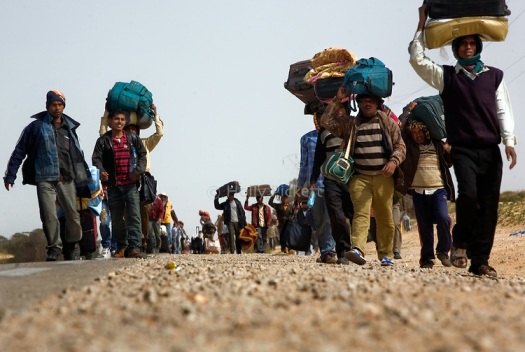In 2011 with the collapse of Libya the international media focused on the hunt for Moammar Gaddafi who was eventually chased down to a storm drain near the sea-coast town of Sirte. During all this time and since there has been very little reporting of the human tragedy unfolding for countless innocent civilians. Among these are the migrant workers, many of them from Bangladesh, who suddently found themselves stranded at desert oil-well facilities. As these were over-run they took to the desert and headed for the coast or west to Tunisia, or even further west, to Morocco.
With the collapse of regimes across North Africa countless thousands of migrants have been on the move. Add to that number the Trans-Sahara migrants coming up from countries like The Gambia, Burkino-Fasso, Mauritania, Chad, Mali and the Ivory Coast. In 2011, according to the UNHCR, approximately 61,000 people trekked across North Africa to the coast. It is as if a whole continent is on the move.
Faced with this human tide heading for the Libyan coast and transiting by boat across the Mediterarranean, the EU has responded with strengthened controls. FRONTEX, already established in 2004, beefed up its patrols in 2012 to deter migration by sea from Libya. Italy deployed its Mare Nostrum initiative as a search-and-rescue opoeration in 2013. However, this was abandoned and a series of high-profile humanitarian disasters at sea involving boats foundering in heavy seas led to FRONTEX putting in place Operation Triton in 2014.
Although naval forces, including Ireland’s Naval Service, tend to represent their operation as primarily search-and-rescue deployments, the intention still remains the same, to deter migrants from transitting from North Africa.

Externalisation
Since 2004 the EU has followed the Australian example of transferring responsiblity for migration management externally to non-EU countries. This was formalised in 2008 by the European Pact on Immigration and Asylum. Although publicly this arrangment is meant to be a set of protolcs and initiatives for the management of migration, in practice it has become the legal platform for what we now know is an externalisation of border controls and the outsourcing of immigration and asylum policy to countries such as Morocco (in the case of Ceuta) and, more recently, to Turkey in relation to Syrians crossing over to the Greek Islands.
In 2016 EU leaders have effectively set aside the 1951 UN Convention on Refugees in order to justify deporting Syrians back to Turkey, a country where most can’t work legally, despite recent legislative changes; where some have allegedly been deported back to Syria; and still more have been shot at the border (from a report by Patrick Kingsley of The Guardian newspaper).
In Greece the EU has forced the government to detail all asylum seekers arriving on their shores. The northward bound buses and trains are no more. To exacerbate the humanitarian situation on the islands, the EU has reneged on promises to provide humanitarian resources; it is to the credit of the Greek people that they have been so welcoming, providing food and other resourcs to asylum-seekers and migrants from their own resources. Under the terms of the EU-Turkey migration deal babies detained in Greece are being denied access to adequate supplies of milk formula, it has been alleged.
Readmission Agreements
Along with the externalisation of border controls, the EU has also entered into readmission agreements with non-EU source and transit countries, for example, Pakistan, Nigeria, Sri Lanka, Burundi, Angola and many, many more. Again Turkey is the primary cntext for this policy at the moment.
These agreements require the countries to “take back” not only their own nationals who have entered and or stayed illegally in an EU Member State, but also any other person in this situation, irrespective of their nationality. Effectively this means that the EU gives these countries a free hand in dealing with returned migrants and refugees. Some become the victim of human rights abuses in these countries. Many can never return to their country of origin. It becomes, in short, a form of imprisonment.
Roger Zetter, writing in World Disasters Report 2012, has said:
By making it almost impossible to seek refuge in Europe we have created conditions where even those who have a powerful claim for protection risk being identified as ‘bogus asylum seekers’ or economic or illegal migrants. As immigration and asylum law become detached from International Humanitarian Law, our responsibility to protect under the 1951 Geneva Convention becomes a matter of political expediency rather than humanitarian obligation.
The bottom-line here is that, despite recent agreements and current policies, we must advocate for a return to full implementation of international refugee law. Equally, EU states must accept full responsiblity for the management of immigration policies – not pass it to other countries. The protection of the full human rights of vulnerable people must remain paramount.


